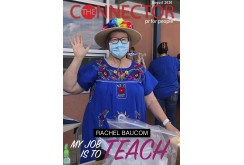Rachel Baucom often toils in her garden under the hot sun of Albuquerque, New Mexico. A school teacher by trade and by calling, her summers are short and intensely hot. She’s back in the classroom early in August, where she teaches a first-grade class at a public school. Most of her children are from families who are Hispanic and among the working-poor. The parents of her children are service workers and during the pandemic are considered essential employees. Some parents work as teachers and health care workers. Others are housekeepers or are employed as fast food workers, custodians and construction workers. Rachel is very concerned about returning to the classroom and being able to ensure safety, for her kids, their families, and for herself and her family—the entire community.










